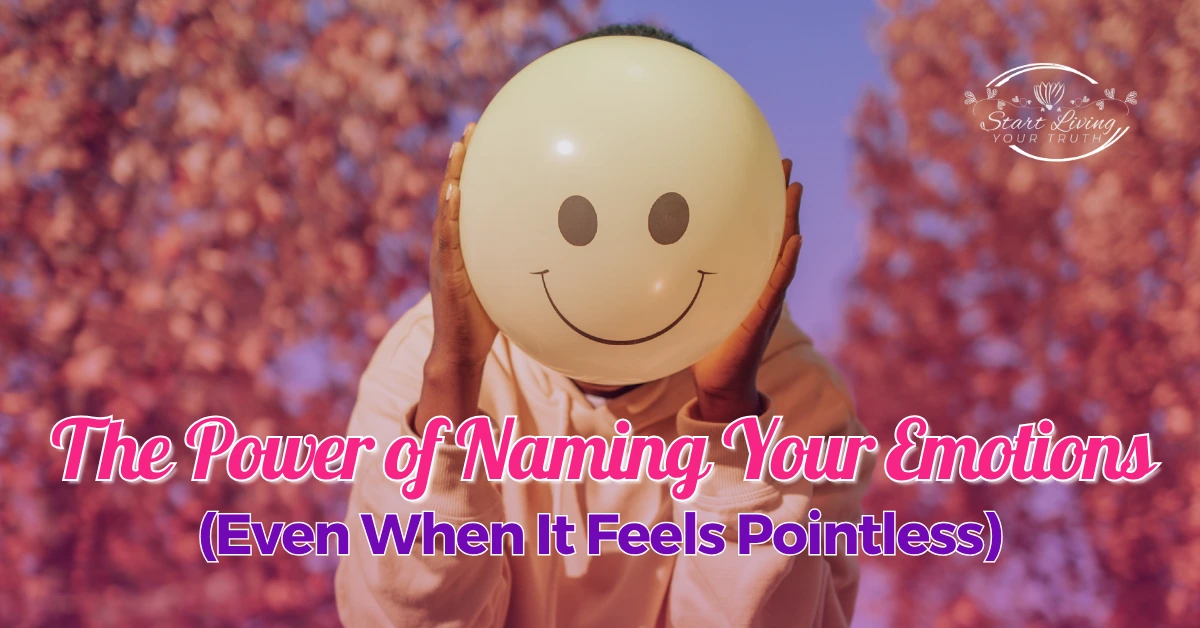
You ever get that feeling where something’s just... off?
You’re going through the motions, answering texts, getting stuff done—but inside? You feel kind of blank. Or tense. Or nervous. Or restless. Or like you’re not quite there. And if someone actually asked how you are, you wouldn’t know what to say. Not really.
You just know you don’t feel like yourself.
That’s why naming what you’re feeling matters. Not because it solves anything right away. But because when you name it, it loosens it’s grip on you. You stop blaming yourself for feeling weird or bad. And you start noticing that maybe there’s something more going on at a deeper level and you’ve been brushing it off.
It’s how you begin to feel more connected to yourself again—instead of always wondering what’s wrong with you.

Most of us didn’t grow up in homes where emotions were talked about in a real way. You learned to keep the peace. Be easy. Don’t make a fuss.
So now? You’re great at functioning. At being the reliable one.At pretending you’re fine, even when something inside feels off.
And because you’ve gotten so used to brushing it off, you don’t even realize how often you say, “I’m just tired,” when what you actually feel is unimportant. Or unwanted. Or overwhelmed.
It’s not your fault. You’re not bad at emotions. You just haven’t had many chances to speak them out loud without being questioned or dismissed.

If you don’t name what you’re feeling at a deeper level, it doesn’t disappear. It sits there. Quiet. And then it leaks out in ways that don’t feel like you.
Maybe you get short with someone and regret it. Maybe you cancel plans without knowing why. Maybe you just feel yourself pulling away.
And then you think, “What’s wrong with me?” “Why can’t I just feel okay?”
But this isn’t about being dramatic or too sensitive. It’s about years of keeping things to yourself.
Naming what’s really going on at the deeper level doesn’t make it all better. But it helps you stop blaming yourself, understand yourself and what’s really going on. And that’s a good place to start.

Saying something like: “I feel disconnected.” “I feel left out.” “I feel like I don’t matter.”
—doesn’t make the feeling go away. But it helps you see it for what it is. It helps you be honest with yourself without making it a big deal or trying to fix it right away.
You stop second-guessing yourself. You start getting clearer on what’s actually going on.
You don’t have to say it out loud to anyone. Just noticing it for yourself is a start. It’s one way to feel a bit more like yourself again.

Sometimes it’s not that you feel nothing. It’s that you feel too much at once, and none of it makes sense. You might snap at someone and immediately regret it—or spend the whole day feeling low and not know why. And when someone asks what’s wrong, all you can say is, “I don’t know.”
That doesn’t mean you’re broken. It just means you haven’t had a moment to slow down and check in with what’s actually there.
Sometimes, saying just one feeling out loud helps you stop wondering if you’re the problem. Like, maybe it’s not that you’re overreacting—maybe you felt ignored. Or not included. Or just not that important in that moment. And when you name it, it starts to feel a bit clearer. Like something you can actually look at instead of just feeling off and not knowing why.
That small bit of clarity matters. Not because it solves everything. But because it helps you stop turning on yourself when you’re already feeling bad.. Not because it solves everything, but because it reminds you that what you're feeling makes sense.

When you don’t name what you’re feeling, stress doesn’t just sit still—it starts piling up. You might think you’re managing fine, but your body tells a different story. You’re tense all the time. Snapping at stuff that shouldn’t matter. Your mind feels like it’s going a million miles an hour, and it’s hard to switch off.
You might chalk it up to being busy or tired, but a lot of the pressure comes from not knowing what’s actually going on inside you.
Saying something like, “I’m overwhelmed,” or “I’m feeling shut out,” gives that stress somewhere to go. It stops the guessing. It lets your body relax a little because now it knows—this is what we’re dealing with.
It won’t fix everything. But it makes it easier to move through the day without feeling like you’re going to snap.

Once you name what you’re feeling, you don’t just react—you get a second to think. To step back.
You stop assuming you’re the problem. You stop spinning out in your head.
Instead of lashing out or shutting down, you understand what’s behind it. You might still feel off, but now you know why. And that gives you a better way to handle it.
This isn’t about doing it perfectly. It’s about making things less confusing inside.

If you’ve been stuffing things down for years, it makes sense that you struggle to name them now. Most people were never shown how.
That’s why I made the Name What You Feel - 1 Hour Emotional Awareness Workbook. It gives you a list of deeper emotions—ones most people don’t think to name right away—so you can go beyond just saying “I’m sad” or “I’m stressed.” It helps you get to the real feeling underneath, the one that actually explains what’s going on. Once you have the right words, you can start to move forward in a way that feels more honest and less overwhelming.
If you feel numb, or like you’re overreacting, or like you should just “get over it”—start here.
This isn’t about digging deep right away. It’s about finding words that match what you already feel but haven’t said yet.

If you’ve ever been told you were too much—or if you’ve learned to keep things to yourself to avoid being misunderstood—this is for you.
Your feelings aren’t wrong. They don’t have to be justified. And they don’t make you weak.
You’re allowed to feel unsure. You’re allowed to feel left out. You’re allowed to feel anything you feel.
Start with one feeling. Say it to yourself.
Let that be enough for today.

Naming your emotions doesn’t just help you feel seen by yourself—it changes what happens next. Instead of reacting on autopilot, you pause. You notice. You might still feel unsettled or uncomfortable, but now there’s space to decide how to respond.
For example, you might realize you’re not actually mad at someone—you’re hurt. Or not actually lazy—you’re discouraged.
That shift changes how you talk to yourself. And it changes how you move through your day.
This isn’t about emotional perfection. It’s about slowly building a sense of what’s actually going on inside you
If this sounds like you—if you’re done trying to figure it all out alone—start with the Name What You Feel - 1 Hour Emotional Awareness Workbook.
It’s simple. No pressure. Just a place to begin.
And when you’re ready to dig deeper—to finally understand the stuff that’s never quite added up—Start Living Your Truth is here for that next step.